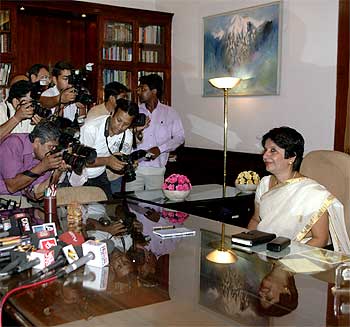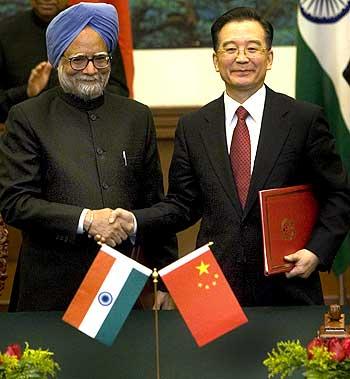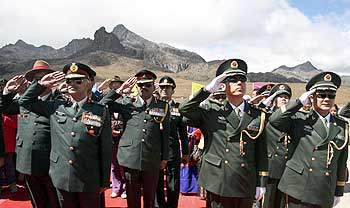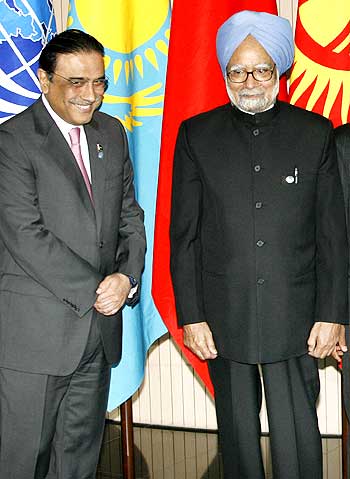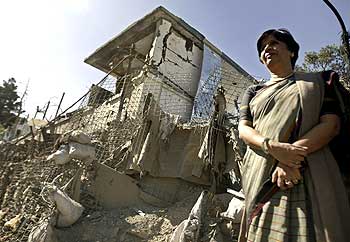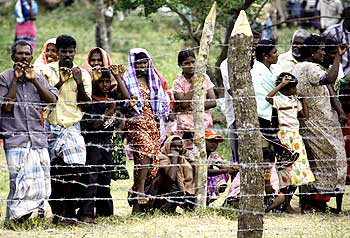 | « Back to article | Print this article |
'Progress is being made slowly but surely'
Nirupama Rao, who took over as the foreign secretary on August 1, has had a variety of issues on her platter -- the reported incursions by China along the border, the attack near the Indian embassy in Kabul, Pakistan dilly-dallying on prosecuting Mumbai terror attack mastermind Hafiz Saeed and the mounting political pressure over the rehabilitation of displaced Tamils in Sri Lanka.
In an interview with Kalyani Shankar of the All India Radio, Rao, who has served as the ambassador to Sri Lanka and China, explains that meaningful dialogue and communication is the only way forward to strengthen India's foreign relations.
You served as the Indian ambassador to China before you took over as foreign secretary. Do you think China's protests about Prime Minister Manmohan Singh's visit to Arunachal Pradesh was on account of the huge voter turnout in the assembly polls or there are other significant issues like Pakistan Prime Minister Yusuf Raza Gilani's visit to Beijing? There have also been reports of Chinese incursions along the border and the controversy about China issuing separate visas to Kashmiris.
We take a long-term perspective in our relations with China. China is our largest neighbour; we share a very long boundary with China. There are outstanding issues relating to this boundary which are yet to be resolved. And the whole issue should be seen in the context of the unresolved boundary question between the two countries. We are very intensively focused on this issue. But at the same time, one must understand that the relationship with China has also been developed in many other areas.
And that development of relations and the concomitant build-up of good communication and better understanding between the governments of the two countries, and indeed also the academic institutions, the business and industry circles, better connectivity, all this has happened in the last twenty years.
As far as the boundary issue between the two countries is concerned, there is still a lot of ground that we have to cover in terms of narrowing differences and building more understanding. But progress in this regard is being made, albeit slowly but surely.
We have the mechanism of the special representatives appointed by the two governments to look into these issues and they have held thirteen rounds of discussions so far. As far as the boundary question is concerned, even we have had these reports of protests and incursions, but one must understand that there is a situation in which both our countries are trying to resolve the boundary question peacefully.
I can say it with all honesty, both governments are convinced that there is no other way to resolve this without dialogue. One has to resolve it through dialogue. I remember our first Prime Minister Jawaharlal Nehru speaking to the Parliament in 1962, saying, "We cannot march to Peking", and I am quoting his words.
But whatever it is, we must take a realistic view that there are differences when it comes to perceiving the Line of Actual Control in the border areas. There are differences also in terms of conflicting territorial claims. So this is a very complex issue. It is one of the most complicated boundary questions that exist anywhere in the world. But I think it is a good development and it is a positive factor that both countries are determined to resolve these issues.
'Arunachal Pradesh is an integral part of India'
Do you think in the next round of discussions between the two special representatives, the issue of incursions and the Arunachal issue will come up?
In fact, the focus that has been given to both these incursions and also to the Arunachal Pradesh issue, I think intensifies the need for the two sides to really sit down to resolve these issues with even more seriousness and determination.
Both governments understand that a peaceful relationship between India and China is not only good for the two countries but it is good for this region, it is good globally also. Just look at the number of issues on which we can cooperate, we are cooperating on the Doha development round, on climate change issues, on cooperation in multilateral fora, in the reform of the international financial system in the wake of the global economic crisis. We must look at this whole relationship in the larger perspective.
But is the government taking these issues very seriously? This is not the first time they have protested about the PM's visit.
Of course we take this seriously, and we have been very particular and very clear and non-ambivalent in expressing our position to the Chinese. We have said that Arunachal Pradesh is an integral part of India, it is an inalienable part of India.
Will there be any change in Dalai Lama's proposed visit to Arunachal next month? The Indian government has reportedly asked him not to make any political statements as China has objected to his visit?
We have always said this clearly, also to China, that His Holiness the Dalai Lama is a spiritual figure, he is a religious figure and he does not indulge in political activities on Indian soil. He is our guest in India and he is free to visit any part of our country.
'We can remove misunderstandings'
Chinese Foreign Minister Yang Jiechi is due to visit India for the Russia-China-India trilateral meet. What issues will be discussed in this meeting?
This is a trilateral meeting of the foreign ministers from India, Russia and China. This is the structure that the three countries have devised and this enables us to discuss issues of regional importance.
Of course, External Affairs Minister S M Krishna will be meeting his Chinese counterpart during this meeting and this meeting will give us the opportunity to touch upon various issues of mutual concern and mutual interest in the bilateral relationship. But you must understand that the larger context of this meeting is trilateral. There will be bilateral meetings and whenever we have the opportunity to meet, as we would on this occasion, the opportunity does arise for us to raise all issues because it is through discussion, through frank and open discussion that we can remove misunderstandings.
What is going to be the agenda of the trilateral meeting?
The agenda of the trilateral meeting will be discussing the regional situation, the opportunities that arise to strengthen dialogue between the three countries, which are major powers in this region, and to look at energy security, to look at issues like better connectivity, dialogue between the academic institutions, the think-tanks of the three countries, business and industry relations. So there is a whole gamut of issues that will be discussed.
'We are the voice of sanity, Indian govt and the people'
We have problems with Pakistan also. What has been the progress after the foreign secretaries of the two countries met in New York in September?
We have had useful meeting with Pakistani Foreign Secretary Shah Mehmood Quershi and Pakistan Foreign Minister Salman Bashir. They were useful meetings that were held in New York in September. And during these meetings, we were able to communicate to the Pakistani side that we have always understood that it is only through dialogue that we can normalise relations between the two countries and build a more satisfying degree of understanding.
We communicated to the Pakistani side on behalf of the government and the people of India that the threat and the effect of terrorism, which has been directed against the people of India from Pakistani soil by groups, by institutions, by individuals that operate with impunity from Pakistani soil, is the cause of utmost concern for us, because we have been victims of terrorism.
For a meaningful dialogue to be transacted between the two countries, between the governments, between the institutions of the two countries, it is essential that Pakistan addresses this threat of terrorism seriously, meaningfully and effectively.
We continue to emphasise to the Pakistani authorities that it is essential that they move resolutely and meaningfully against the perpetrators of the Mumbai terror attack and they take action against these individuals, because it is only through that process that we will see an end to these problems.
We have been saying that the culprits behind 26/11 should be brought to book. We have been insisting on that again and again. We have been saying that there will be no composite dialogue; but still there is not much forward movement. They only go ahead with whatever they are saying. They say no credible evidence has been provided to them.
We should not, in my view, let down our guard on this issue. I feel very strongly that we must continue to emphasise our concerns to Pakistan because what we are saying is for the good of Pakistan also.
You see the effect of terrorism in Pakistan; it is time Pakistan understood the clear and present danger that emnates from terrorism. We are the voice of sanity, the Indian government and the Indian people, and I think Pakistan must come round to understanding the sincerity and the seriousness that we attach to this.
'We have no agenda in Afghanistan'
I want to move forward to Afghanistan where our embassy has been attacked recently, for the second time. Where is it going to lead us?
Again, the attacks on our embassy in Kabul last week and the attack in July last year have also brought home, not only to us in this region, but also to the international community, the threat and danger that exists from terrorism.
There is a great and urgent need for the international community to be the one tackling this threat. We are in Afghanistan to help the people of Afghanistan. Our development partnership with Afghanistan has won us hearts and minds in Afghanistan and there is no doubt about it. I went to Afghanistan myself and had the opportunity to meet President Hamid Karzai, the foreign minister and National Security Adviser Dr Rasool.
All of them were unanimous in their appreciation of the role that India is playing in Afghanistan to help the Afghan people. We have no other agenda in Afghanistan, we are there to help.
But Pakistan should realise this.
Of course, it is essential that Pakistan realises this and Pakistan understands that we are there for legitimate reasons, we are there to help the people of Afghanistan.
The next big thing for India is Dr Singh's State Visit to Washington in November. What is going to be on the agenda for the two leaders?
Well, we have a global partnership with the United States. As President Obama said recently to our PM "there are new well springs of cooperation in this relationship". When Secretary of State Hillary Clinton visited India in July, we announced this new dialogue of architecture between the two countries. The pillars not only concern strategic issues or security issues, they also concern human development issues, issues like agriculture, energy, cooperation in energy, gender empowerment, the environment, the education issues.
The visit of our PM to Washington will enable us to take this dialogue forward and it will strengthen and consolidate our partnership with the government and with the people of the US.
'We are in constant touch with Sri Lanka'
You were the High Commissioner to Sri Lanka earlier and right now the leaders from Tamil Nadu, and all parties, they are protesting the detention of Tamil fishermen by the Sri Lankan Navy. What is your comment about this?
We are in constant touch with the Sri Lankan authorities. Whenever there are cases of our fishermen, unwittingly or inadvertently, straying into Sri Lankan waters and being apprehended by the Sri Lankan side, we take immediate steps to secure their release and take up their case with the Sri Lankan authorities.
What about the ethnic Tamils (in the transit camps) and their rehabilitation?
We have announced a Rs 500 crore package to help the ethnic Tamils because then they can return to their homes and resume their livelihood.
